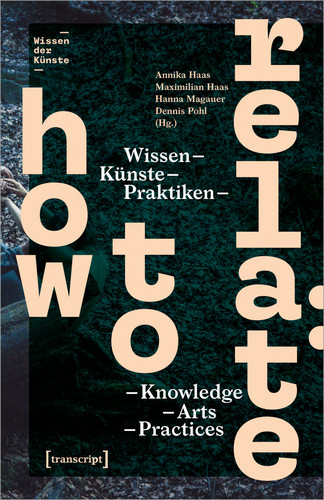How to Relate – Knowledge, Arts, Practices
Annika Haas, Maximilian Haas, Hanna Magauer, Dennis Pohl (Hg.): How to Relate – Knowledge, Arts, Practices. Bielefeld: transcript 2021.
New publication: Volume six of the book series published by the DFG Research Training Group “Knowledge in the Arts” with transcript Verlag.
The series is edited by Barbara Gronau and Kathrin Peters, and the designer is Jenny Baese.
Relations are not given, they are made together. This volume examines relationalities as processual negotiations between the arts and sciences, between built space and the social body, between theoretical and poetic-artistic writing and speaking, between form, material and action. The plea is for a knowledge politics of the arts that starts from a radical entanglement of theoretical, aesthetic, medial and social practices and techniques.
The book is currently only available in Open Access. Further information about this book can be found here.
Table of contents
„Beziehungsfragen. Eine Einleitung / Relational Issues. An Introduction“ – Annika Haas, Maximilian Haas, Hanna Magauer, Dennis Pohl
„Techniques as Modes of Relating: Thinking with a Transdisciplinary Experiment“ – Melanie Sehgal
„How to Relate Differently: Scenes of Shared Research from the Programs "Performing Citizenship" and "Assemblies & Participation" – Sibylle Peters
„Verkomplizierung der Möglichkeiten: Gegenwartskunst, Epistemologie, Wissenspolitik“ – Tom Holert
„The Angry Christ“ – Amy Lien und Enzo Camacho
„Über die praktischen Bedingungen von Forschung zwischen Theorie und Praxis, Wissenschaften und Künsten / On the Practical Conditions of Research between Theory and Practice, the Sciences and the Arts“ – Maximilian Haas
„Konvergenz der Zukünfte: Über widerständige Ästhetiken, imaginative Gegengeschichten und Institutionen als Beziehungsweisen“ – Bini Adamczak und Nora Sternfeld im Gespräch
„Becoming Common: Remarks on the (Im)Possibilities of Sharing“ – Maurício Liesen
„Relationalität elliptisch gedacht / Elliptic Relationality“ – Annika Haas
„Offen und entschieden: die idiosynkratische Radikalität der Kunst“ – Mirjam Schaub
„Film als Gegenverwirklichung“ – Ghassan Salhab und Michaela Ott im Gespräch
„Translation: A Relational Practice“ –Annika Haas with Emily Apter
„Situierte Formen: Kunst, Sprache und die Frage nach ihren Eigenlogiken / Situated Forms: Thoughts on Arts, Language and their Intrinsic Logics“ – Hanna Magauer
"Fame Is the Name of the Game": Aneignung und celebrity culture“ – Brigitte Weingart
„The 24/7 Bed: Privacy and Publicity in the Age of Social Media“ – Beatriz Colomina
„Tools, Infrastrukturen und Räume des relationalen Forschens / Tools, Infrastructures, and Spaces of Relational Research“ – Dennis Pohl
„How to Relate in Contemporary Dance?“ – Maximilian Haas in conversation with Alice Chauchat, Gradinger/Schubot and Jeremy Wade
„Figuration and/as Critique in Relational Matters“ – Kathrin Thiele
„We Have Always Been Geohackers“ – Possible Bodies (Helen Pritchard, Jara Rocha, Femke Snelting)
„Der planetare Test“ – Orit Halpern
